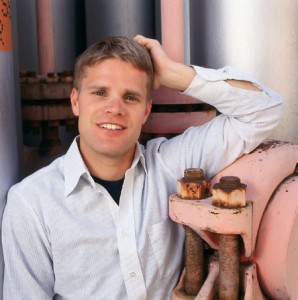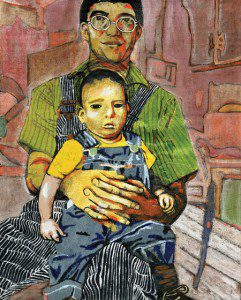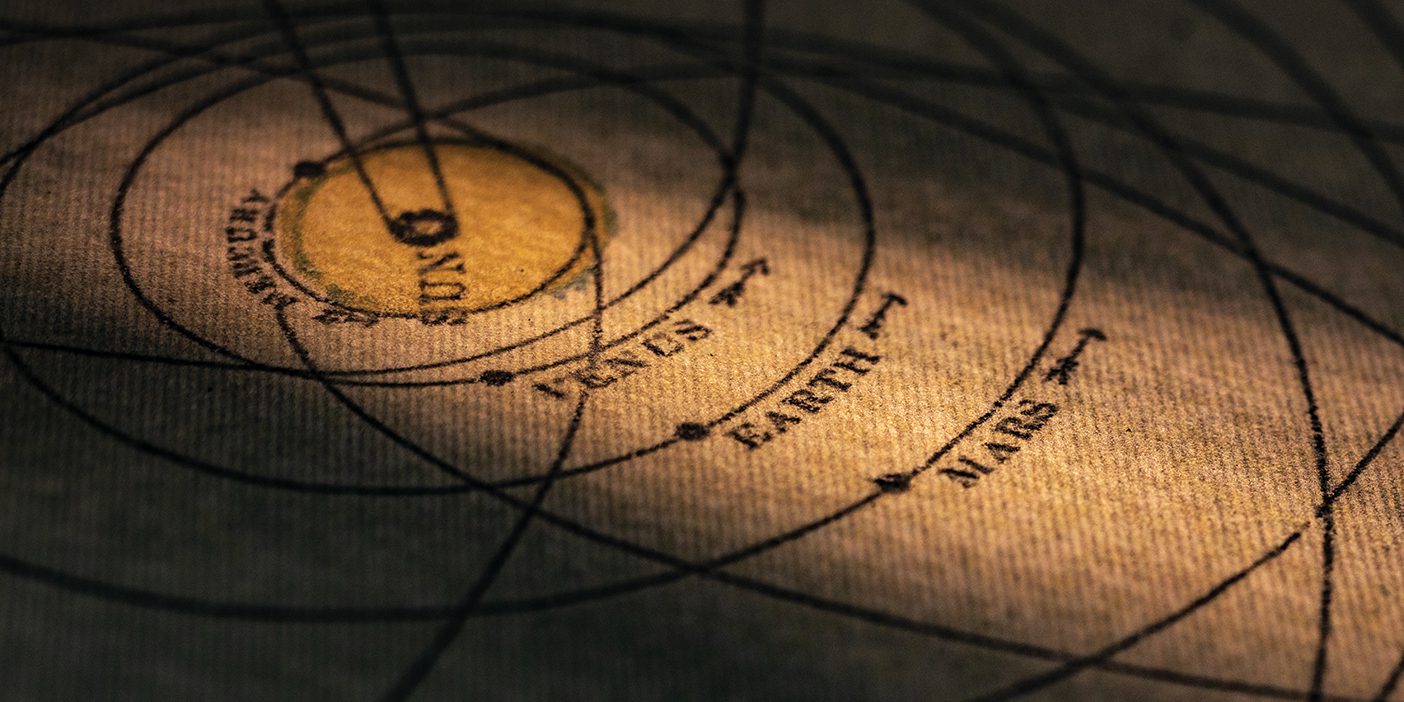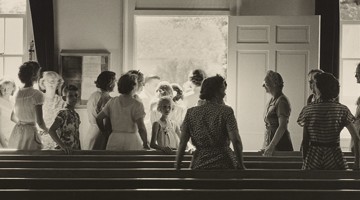Civil engineer Mike Lowry takes his chances to improve the lives of individuals and communities.
Being born during a blizzard seems fitting for graduate student Michael B. Lowry, ’02. His life has been a whirlwind of adventure, driven by his love of learning.
Lowry is an individual example of BYU’s motto, “The World Is Our Campus.” For the last three summers this former river guide from Ohio has embarked on backpacking expeditions to Mexico and Central America. After one trip Lowry said, “After nine weeks of traveling, I felt like I’d ended another mission. I had as many spiritual experiences, I taught the discussions probably just as much, and I met as many good people.”
Although Lowry credits prayer as his main guidance in life, he feels his life has also been influenced by something else: “I think I’m just really lucky—wonderful things just happen to me,” Lowry says, laughing as he recalls an example. “One time I walked out of a building thinking, ‘I’m really hungry, I wish I had something to eat.’ Right then someone walked by with a tray of cookies and said, ‘Hey, want a cookie?’ Stuff like that happens to me all the time!”

Mike Lowry | Photo by Bradley Slade
He recently had the desire to go to Africa but wasn’t sure how to make it happen. Then, as luck would have it, the father of a friend called him and asked, “Do you want to go to Africa?” The father was a carpenter for the Church and his latest project was the Accra Ghana Temple. He invited Lowry to be a translator for his company of carpenters who were all from Mexico. Lowry’s three months in Ghana during fall 2002 presented him with new adventures and more opportunities to learn and serve, including helping a volunteer physician distribute hearing aids to the deaf. Lowry said the look on the faces of those being able to hear for the first time was priceless. “At first they were scared, since they’d never really heard before—but after they got used to it, they couldn’t stop smiling. I’d leave and come back later, and they’d still be smiling,” Lowry says, with a smile of his own as he recalls the experience.
Lowry’s learning continues at BYU as he works on a master’s degree in civil engineering. He chose his profession as a way to directly help society. He says he finds in civil engineering the opportunity to both improve urban life and protect the environment. “I discovered this during my mission,” he explains, having served a Spanish-speaking mission to Philadelphia. “While walking the streets and riding the public transportation I realized cities can be improved through good civil engineering. If urban areas are cleaner and more livable, then the natural environment can be preserved by reducing sprawl and pollution.”
His junior and senior year, Lowry was president of the BYU student chapter of the American Society of Civil Engineers. Because of the keen interest in urban transportation planning Lowry developed from his BYU classes, professors of civil engineering Mitsuru Saito, ’81, and Richard J. Balling asked him to join in a research project funded by the National Science Foundation. Lowry agreed, turning the research into his master’s thesis. For the project he utilized a computer program to seek ways to reduce traffic congestion and vehicular pollution along Utah’s Wasatch Front. Lowry’s study was published in the Journal of the Transportation Research Board, and in January 2003 he presented it at a conference in Washington, D.C.
Although Lowry has big dreams of future endeavors, including pursuing a PhD, he is content with the present. He believes focusing on the right thing at the right time is important. “I’m happy where I’m at,” Lowry says. “I have just as much fun in Provo as I do anywhere else—but in two months I really want to be in Norway.”ont size=”3″ face=”Times New Roman”>
Lowry is an individual example of BYU’s motto, “The World Is Our Campus.” For the last three summers this former river guide from Ohio has embarked on backpacking expeditions to Mexico and Central America. After one trip Lowry said, “After nine weeks of traveling, I felt like I’d ended another mission. I had as many spiritual experiences, I taught the discussions probably just as much, and I met as many good people.”
Although Lowry credits prayer as his main guidance in life, he feels his life has also been influenced by something else: “I think I’m just really lucky—wonderful things just happen to me,” Lowry says, laughing as he recalls an example. “One time I walked out of a building thinking, ‘I’m really hungry, I wish I had something to eat.’ Right then someone walked by with a tray of cookies and said, ‘Hey, want a cookie?’ Stuff like that happens to me all the time!”
He recently had the desire to go to Africa but wasn’t sure how to make it happen. Then, as luck would have it, the father of a friend called him and asked, “Do you want to go to Africa?” The father was a carpenter for the Church and his latest project was the Accra Ghana Temple. He invited Lowry to be a translator for his company of carpenters who were all from Mexico. Lowry’s three months in Ghana during fall 2002 presented him with new adventures and more opportunities to learn and serve, including helping a volunteer physician distribute hearing aids to the deaf. Lowry said the look on the faces of those being able to hear for the first time was priceless. “At first they were scared, since they’d never really heard before—but after they got used to it, they couldn’t stop smiling. I’d leave and come back later, and they’d still be smiling,” Lowry says, with a smile of his own as he recalls the experience.
Lowry’s learning continues at BYU as he works on a master’s degree in civil engineering. He chose his profession as a way to directly help society. He says he finds in civil engineering the opportunity to both improve urban life and protect the environment. “I discovered this during my mission,” he explains, having served a Spanish-speaking mission to Philadelphia. “While walking the streets and riding the public transportation I realized cities can be improved through good civil engineering. If urban areas are cleaner and more livable, then the natural environment can be preserved by reducing sprawl and pollution.”
His junior and senior year, Lowry was president of the BYU student chapter of the American Society of Civil Engineers. Because of the keen interest in urban transportation planning Lowry developed from his BYU classes, professors of civil engineering Mitsuru Saito, ’81, and Richard J. Balling asked him to join in a research project funded by the National Science Foundation. Lowry agreed, turning the research into his master’s thesis. For the project he utilized a computer program to seek ways to reduce traffic congestion and vehicular pollution along Utah’s Wasatch Front. Lowry’s study was published in the Journal of the Transportation Research Board, and in January 2003 he presented it at a conference in Washington, D.C.
Although Lowry has big dreams of future endeavors, including pursuing a PhD, he is content with the present. He believes focusing on the right thing at the right time is important. “I’m happy where I’m at,” Lowry says. “I have just as much fun in Provo as I do anywhere else—but in two months I really want to be in Norway.”









